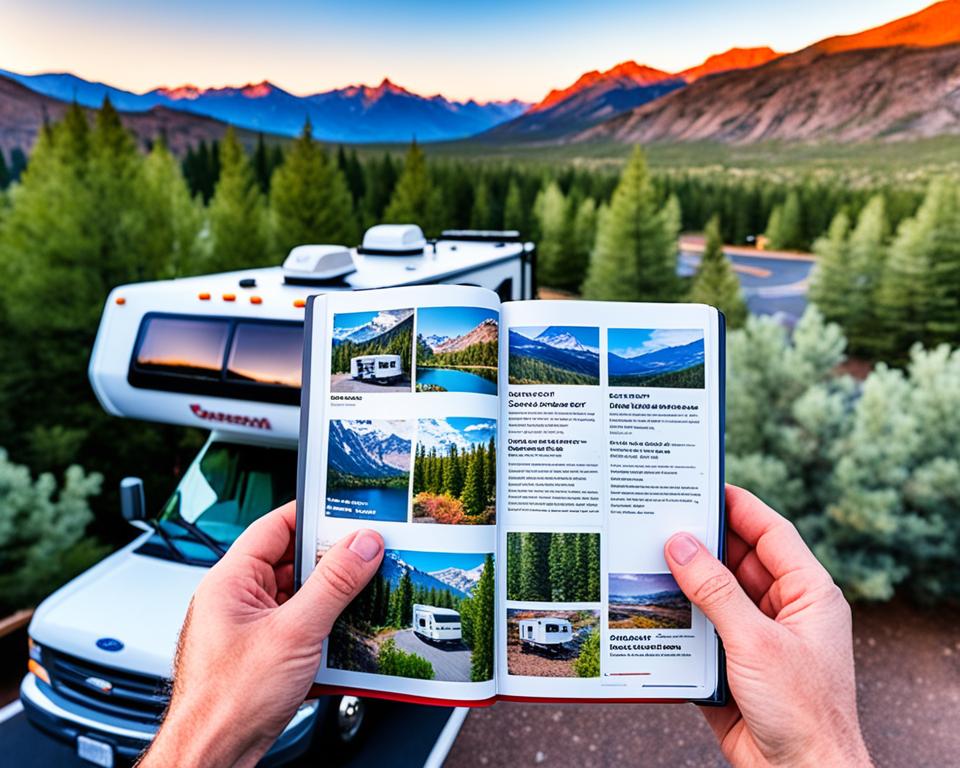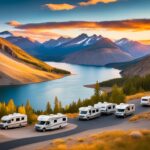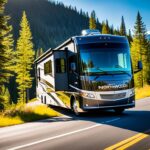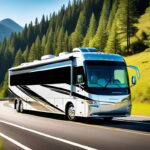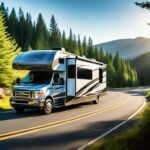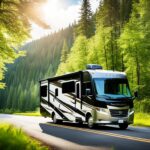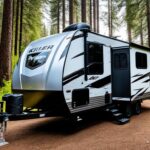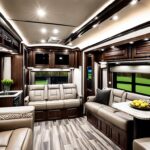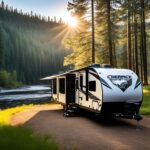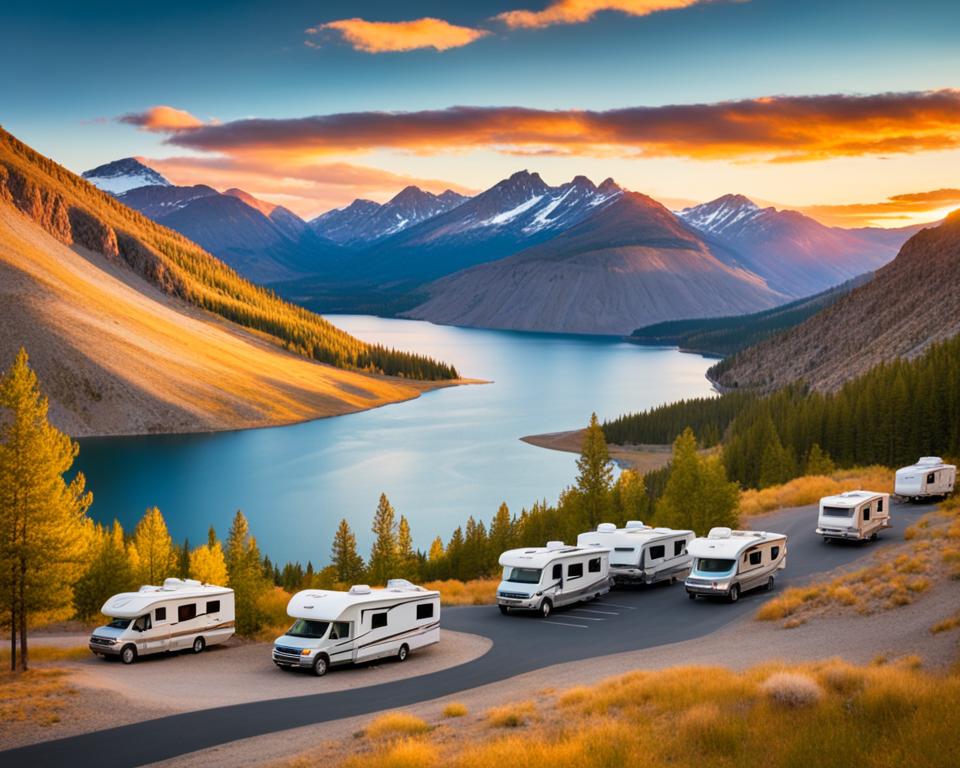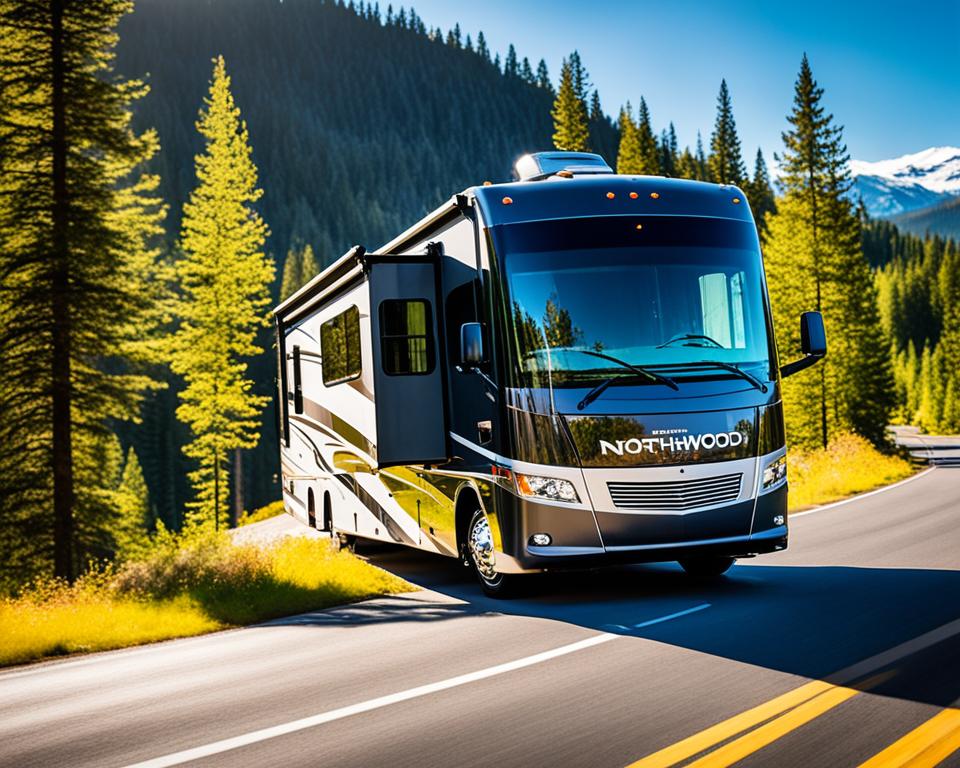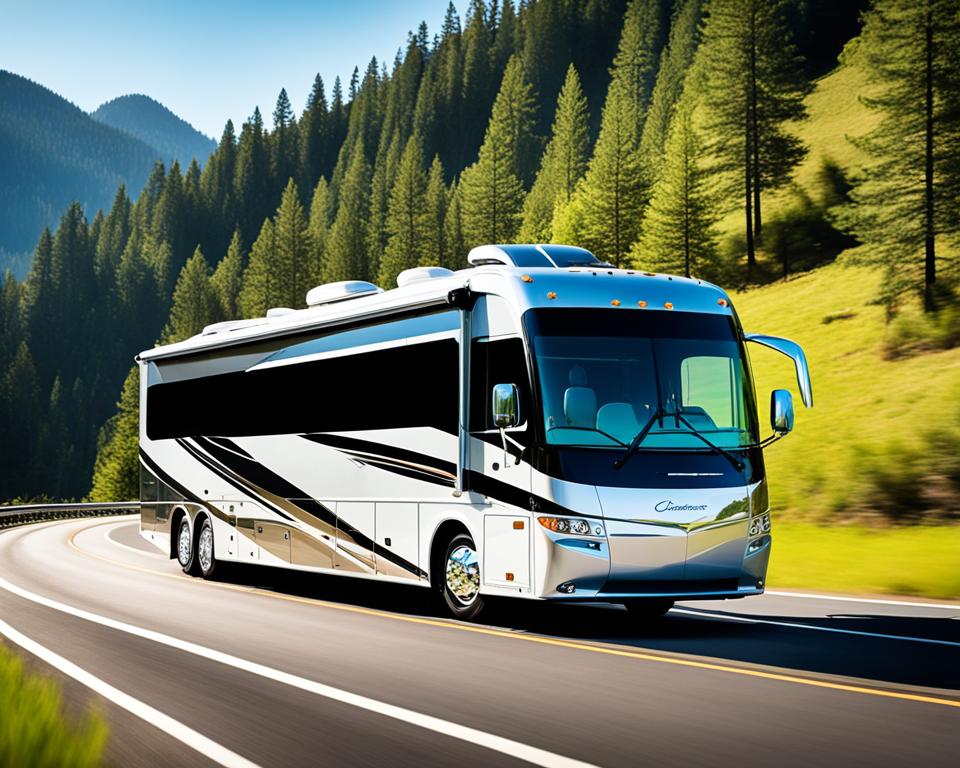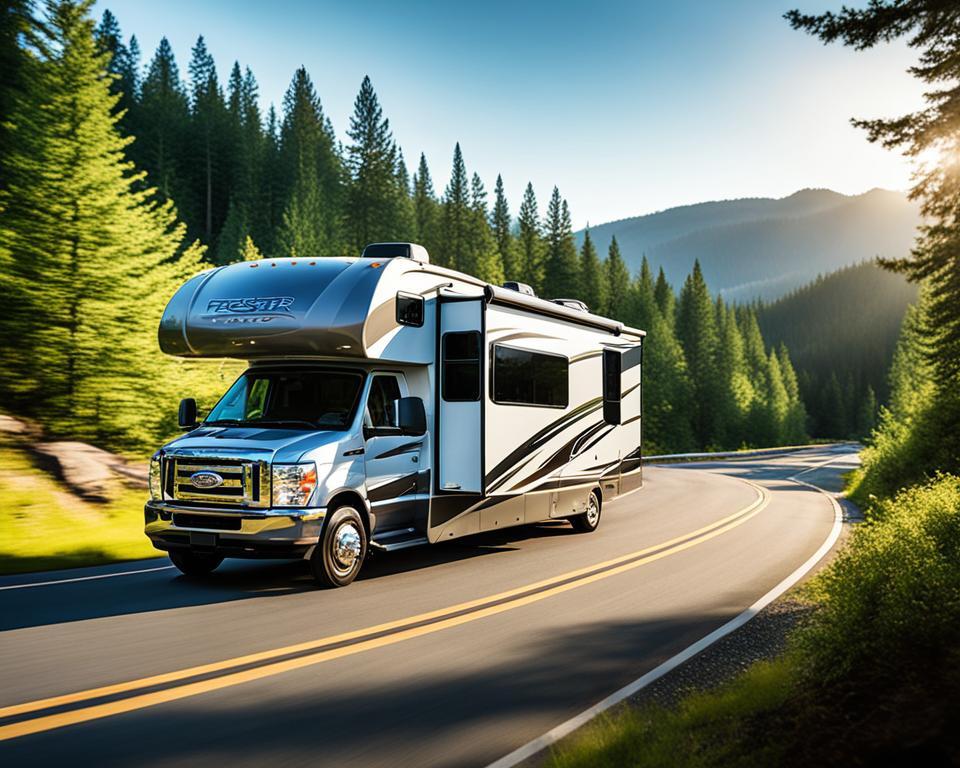Welcome to the ultimate RV review guide for 2024! If you’re in the market for an RV, you’ve come to the right place. Whether you’re a seasoned traveler or new to the world of RVing, our expert tips and insights will help you make an informed decision. We understand that choosing the right RV can be overwhelming with so many options available. That’s why we’ve created this comprehensive guide to take you through the process step-by-step.
In this guide, we will cover everything you need to know about RVs for full-time living. From size considerations to living space, travel style to RV brands, we’ve got you covered. By the end of this guide, you’ll have all the information you need to find the best RV for your adventures.
Key Takeaways:
- Find expert tips and insights to help you choose the ideal RV for your adventures.
- Consider size, living space, and travel style when selecting an RV for full-time living.
- Explore different types of RVs and their suitability for your needs.
- Learn about the pros and cons of various RV brands and manufacturers.
- Consider renting an RV for a test drive before making a purchase.
The Best RVs for Full-Time Living
When it comes to choosing an RV for full-time living, there are several factors to consider. Size, type of places you want to stay, camping style, and your comfort level with driving and parking a large vehicle all play a role in finding the best RV for full-time living.
Size
Size is one of the most important factors to consider when selecting an RV for full-time living. It directly impacts the comfort and functionality of the living space. You’ll want to find an RV size that accommodates all your daily activities without feeling cramped or restricted.
Type of Places You Want to Stay
The locations you plan to visit and stay at also factor into your RV selection. If you enjoy exploring more remote and picturesque destinations like national parks, you may need a smaller RV that can navigate narrow roads and fit into tight campsites. If you prefer camping resorts with spacious accommodations, a larger RV with more amenities may be a better fit.
Camping Style
Your preferred camping style is another consideration. Some RVers enjoy boondocking and require an RV with self-sustainability features like solar panels and large freshwater tanks. Others prefer full-hookup campsites that provide all necessary amenities. Understanding your camping style will help you choose an RV that aligns with your needs.
Comfort Level with Driving and Parking
Lastly, consider your comfort level with driving and parking a large vehicle. If you’re new to RVing or prefer ease of maneuverability, a smaller RV or towable option may be more suitable. However, if you are confident behind the wheel and value the convenience of an all-in-one unit, a drivable RV may be a better choice.
In this section, we will further explore these factors to help you find the best RV for full-time living.
RV Size Comparison
| RV Type | Length | Width | Height |
|---|---|---|---|
| Class A Motorhome | 30-45 feet | 8-9 feet | 12-13.5 feet |
| Class B Motorhome | 18-24 feet | 7-7.5 feet | 9-9.5 feet |
| Class C Motorhome | 22-32 feet | 8-9 feet | 10-12 feet |
| Travel Trailer | 10-40 feet | 6-8.5 feet | 8-10 feet |
| Fifth Wheel | 20-45 feet | 8-8.5 feet | 9-14 feet |
Size Considerations for Full-Time RV Living
When it comes to choosing an RV for full-time living, size is a crucial factor to consider. Many new full-time RVers are often tempted to buy the largest RV they can find, assuming that more living space will compensate for the downsizing from a house or apartment. However, the ideal size of your RV should be determined by your planned destinations and camping style.
If your goal is to visit national and state parks, it’s important to note that these campgrounds often have size limitations for RV accommodations. Therefore, opting for a smaller RV will better suit your needs and ensure that you have access to more campsites.
On the other hand, if you plan to spend most of your time in RV resorts or private campgrounds that can accommodate larger RVs, you may have more flexibility in choosing a bigger RV with additional features and amenities.
It’s essential to strike the right balance between living space and mobility. While a larger RV might provide more room for daily living, it can be more challenging to maneuver, especially on narrower roads or in crowded areas. Smaller RVs, on the other hand, offer greater maneuverability and accessibility, making them suitable for those who prioritize travel and exploration.
Pros and Cons of Different RV Sizes
| RV Size | Pros | Cons |
|---|---|---|
| Large RV | Ample living space, more amenities, comfort | Difficult to drive, limited access to smaller campsites |
| Small RV | Greater maneuverability, better access to smaller campsites | Less living space, limited amenities |
Ultimately, the ideal RV size for full-time living depends on your personal preferences, camping style, and the places you plan to visit. It’s important to carefully evaluate your needs and consider the trade-offs between living space and mobility before making a decision.
Living Space vs. Comfortable Travel Days
When it comes to choosing an RV for full-time living, one of the key considerations is finding the right balance between living space and comfortable travel days. Different RVs offer unique layouts and features, each with its own pros and cons.
On one hand, there are RVs that prioritize spacious living areas, providing ample room for relaxation, socializing, and daily activities. These RVs often come equipped with luxurious amenities such as large kitchens, comfortable seating areas, and multiple sleeping arrangements. They are perfect for those who value a home-like living experience while on the road. However, it’s important to consider that these larger RVs can be more challenging to drive and park, especially in tight or crowded spaces. They require a higher level of skill and confidence behind the wheel.
On the other hand, there are drivable RVs that offer convenient maneuverability and ease of travel. These RVs, such as Class B or Class C motorhomes, are typically smaller in size but provide a more compact and manageable layout. They are ideal for those who prioritize ease of driving and parking, allowing for greater flexibility and accessibility during their travels. However, these smaller RVs may have limited living space, especially when it comes to larger groups or extended trips.
It’s important to assess your own needs and preferences when considering the layout and size of your RV. Think about your travel style, the number of people who will be living in the RV, and the types of destinations you plan to visit. To help you make an informed decision, here are some factors to consider:
- Living Space: Determine how much space you and your travel companions need for comfortable daily living. Think about the activities you enjoy doing inside the RV, such as cooking, dining, socializing, and relaxing. Consider whether you prefer open floor plans or separate rooms for privacy.
- Travel Comfort: Assess your comfort level with driving and parking larger vehicles. Consider the driving conditions you are likely to encounter and the level of confidence and skill required. Drivable RVs may offer a smoother and easier travel experience.
- Layout Flexibility: Look for RV layouts that can adapt to your changing needs. Some RVs offer versatile furniture configurations that allow you to optimize the space according to your preferences, such as transforming a dining area into an additional sleeping area.
Remember, finding the right balance between living space and comfortable travel days is crucial for a satisfying RV lifestyle. Take the time to explore different RV layouts, visit dealerships, and even rent RVs to experience firsthand how different sizes and layouts can impact your comfort and travel experience.
Types of RVs for Full-Time Living
When it comes to full-time living in an RV, there are various types of RVs to choose from. Each type offers its own unique advantages and features that cater to different preferences and lifestyles. Whether you prefer a towable RV or a drivable motorhome, there is an option that will suit your needs.
Towable RVs
Towable RVs are an excellent choice for those who want the convenience of a separate tow vehicle and the luxury of larger living spaces. They are ideal for individuals or families who desire the comfort and amenities of a home while enjoying their full-time RV lifestyle.
- Travel Trailers: Travel trailers are versatile and come in various sizes and floor plans. They can be towed by a truck or SUV, making them a popular choice for full-time RVers.
- Fifth Wheels: Fifth wheels offer additional living space and often include features such as multiple bedrooms and bathrooms. They are towed by a hitch mounted in the bed of a pickup truck.
Drivable RVs
If you prefer the convenience and ease of driving, drivable RVs are a great option for full-time living. They provide the freedom to explore different destinations without the need for a separate tow vehicle.
- Class A Motorhomes: Class A motorhomes are spacious and luxurious, offering the most amenities and living space among all RV types. They resemble a bus or coach and are built on a heavy-duty chassis.
- Class B Motorhomes: Class B motorhomes, also known as camper vans, are compact and versatile. They are easy to drive and maneuver, making them suitable for both urban and outdoor adventures.
- Class C Motorhomes: Class C motorhomes are a mid-sized option that offers a combination of comfort and drivability. They are built on a truck chassis and are popular for their over-cab sleeping compartments.
No matter which type of RV you choose, it’s important to consider factors such as space requirements, lifestyle preferences, and budget. Conduct thorough research and weigh the pros and cons of each option to make an informed decision that aligns with your full-time RV living goals.
“Choosing the right type of RV for your full-time living is crucial to ensure comfort, convenience, and a fulfilling lifestyle on the road.” – RV Expert
Considerations for Daily Living in an RV
Daily living in an RV requires careful consideration of your specific needs and requirements. When it comes to creating a comfortable and functional living space, there are a few key factors to keep in mind. Let’s explore some essential considerations for RV daily living:
Sleeping Areas
Having a good night’s sleep is crucial, whether you’re on a short road trip or living in your RV full-time. Consider the number of people who will be staying in the RV and ensure that there are enough sleeping areas for everyone. Some RVs offer various sleeping configurations, such as bunk beds or sofa beds, to accommodate different needs.
Workspace for Remote Work
If you plan on working remotely while living in your RV, having a dedicated workspace is essential. Consider the size and layout of the RV to determine if there is enough room for a comfortable desk or work area. Look for RVs with built-in workstation options or space that can be easily converted into an office during work hours.
Storage Capacity
Storage space is essential for organizing your belongings and keeping your RV neat and tidy. Evaluate the storage capacity of different RV models by considering the number and size of cabinets, closets, and compartments available. Ensure that there is enough storage for your clothes, kitchen supplies, outdoor gear, and any other items you’ll need on your journey.
Overall Comfort
Living in an RV should still provide the comforts of home. Consider factors such as the size of the living area, seating options, climate control features, and entertainment systems. Look for RVs with comfortable seating arrangements, efficient heating and cooling systems, and entertainment options like TVs or audio systems to enhance your overall comfort while on the road.
In this section, we have explored some important considerations for daily living in an RV. By taking into account factors such as sleeping areas, workspace for remote work, storage capacity, and overall comfort, you can ensure that your RV meets your specific needs and enhances your overall living experience. Now, let’s move on to the next section where we will discuss choosing the right RV based on your travel style and preferences.
Choosing the Right RV for Your Travel Style
Your travel style and preferences play a significant role in determining the best RV for your adventures. Whether you prefer exploring serene national parks, indulging in the comforts of camping resorts, or seeking off-the-grid experiences through boondocking, finding an RV that aligns with your travel style is crucial for an unforgettable journey.
Rather than a one-size-fits-all approach, consider the specific features and capabilities that will enhance your travel experiences based on your camping style and desired destinations. To assist you in making an informed choice, we’ve outlined key factors to consider when selecting the right RV for your travel preferences and destinations.
1. RV Size:
Consider the size and maneuverability of the RV. For those planning to visit national parks or campsites with size limitations, a smaller RV may be more suitable. However, if you prioritize spacious living areas and amenities, a larger RV might be ideal.
2. Travel Amenities:
Think about the amenities you require for a comfortable journey. Do you prioritize a full kitchen and bathroom? Are you looking for spacious sleeping arrangements? Defining your must-have amenities will help narrow down the RV options that fit your travel preferences.
3. Travel Range:
Consider your intended travel range. If you plan to explore vast distances, a fuel-efficient RV with a larger fuel tank might be preferable. On the other hand, if you prefer shorter trips or frequent stops, a more compact RV with better maneuverability could be a better choice.
4. Storage Capacity:
Assess your storage needs based on the duration of your trips and the equipment you plan to bring along. If you’re an outdoor enthusiast with camping gear and adventure equipment, ample storage space is essential. Evaluate the storage compartments and interior storage options of potential RVs.
5. Off-Road Capabilities:
If you’re an adventurous traveler who enjoys off-road exploring or exploring remote locations, consider an RV with off-road capabilities. Look for features such as enhanced suspension, all-terrain tires, and durable construction that can handle rugged terrains.
By methodically evaluating these factors and considering your unique travel style and preferences, you’ll be able to find an RV that perfectly suits your needs and enhances your adventures.
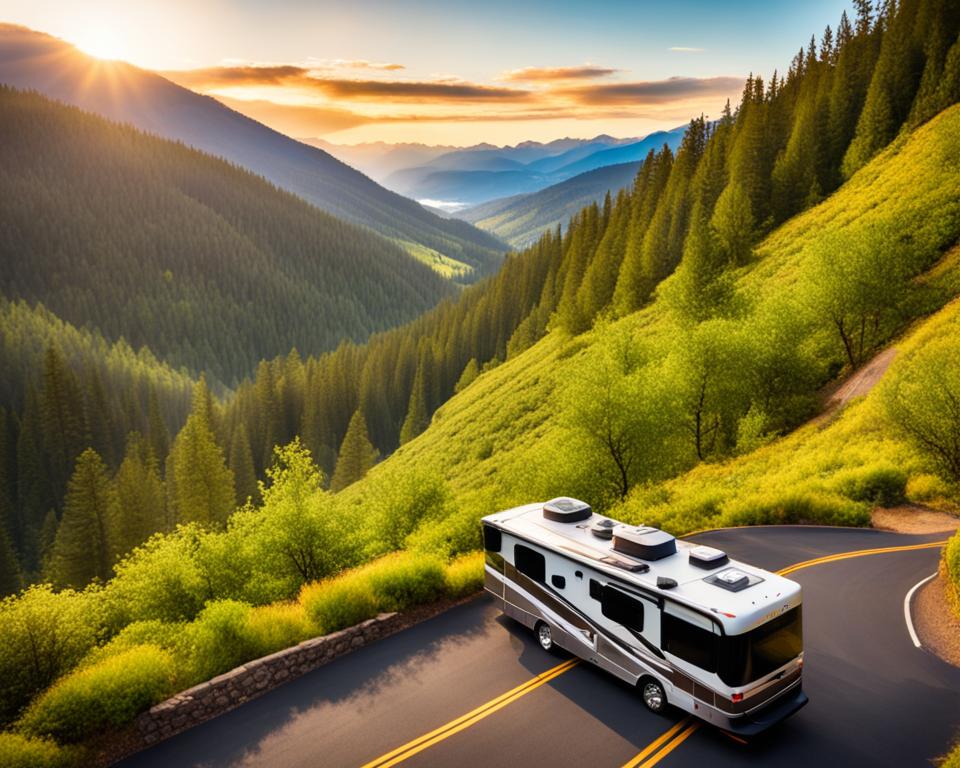
Remember, choosing the right RV is a pivotal step in creating memorable travel experiences. Tailoring your decision to your travel style ensures that you have the ideal home-on-wheels to explore the open road and discover breathtaking destinations.
Pros and Cons of Different RV Brands
Different RV brands offer unique features, quality craftsmanship, and customer service. In this section, we will explore the pros and cons of various RV brands based on customer ratings, industry feedback, and awards. We will highlight the top brands for each RV type and provide insights into why they rank among the best in the market.
Class A Motorhomes
| RV Brand | Pros | Cons |
|---|---|---|
| Winnebago | 1. Spacious interiors with luxurious amenities. | 1. Relatively higher price range. |
| Thor Motor Coach | 1. Wide range of floor plans to suit different preferences. 2. Good value for money. | 1. Some models have reported quality issues. |
Class B Motorhomes
| RV Brand | Pros | Cons |
|---|---|---|
| Airstream | 1. Iconic, sleek design. 2. High-quality interior furnishings. | 1. Limited interior space compared to larger RV types. |
| Hymer | 1. Innovative design features. 2. Excellent fuel efficiency. | 1. Higher price range. |
Class C Motorhomes
| RV Brand | Pros | Cons |
|---|---|---|
| Forest River | 1. Wide range of floor plans and customizable features. | 1. Some models have reported quality control issues. |
| Jayco | 1. Affordable options with good quality construction. | 1. Customer service can sometimes be challenging to reach. |
Travel Trailers
| RV Brand | Pros | Cons |
|---|---|---|
| Grand Design | 1. High-quality construction and innovative features. | 1. Limited availability of service centers. |
| Oliver Travel Trailers | 1. Customizable options and attention to detail. | 1. Higher price range. |
Renting an RV for a Test Drive
Considering an RV purchase but unsure which model and size would best suit your needs? Renting an RV for a test drive is a fantastic way to gain firsthand experience and explore different options. Not only does it provide the opportunity to get a feel for the layout and features of an RV, but it also allows you to assess its functionality and performance on the road.
There are several key benefits to renting an RV before making a purchase:
- Test Drive Different Models: Renting enables you to test drive various RV models and find the one that aligns with your preferences and requirements. You can explore different layouts, sizes, and amenities to determine what works best for you and your travel companions.
- Experience Realistic RV Living: Renting an RV gives you the opportunity to experience realistic RV living. Spending a few days or a week in a rented RV allows you to assess the practicality and comfort of the living space, ensuring it meets your expectations and suits your lifestyle.
- Try Before You Buy: Making a significant investment in an RV can be daunting. Renting an RV before purchasing allows you to avoid potential buyer’s remorse by ensuring you make an informed decision based on firsthand experience and personal preferences.
When renting an RV for a test drive, it’s important to choose a reputable RV rental company. Look for companies with positive customer reviews, responsive customer service, and a wide variety of RV options to choose from. Here are a few recommended RV rental companies:
- Cruise America
- Outdoorsy
- RVshare
- Road Bear RV
Before embarking on your RV trial, it’s helpful to have a plan in place to make the most of your rental experience:
- Create a Checklist: Prior to picking up the RV, create a checklist of essential features and amenities you want to evaluate during your test drive. This will ensure you don’t overlook any important factors while assessing the RV’s suitability for your needs.
- Ask Questions: Take advantage of the rental company’s expertise and ask any questions you may have about the RV’s features, operations, and maintenance. This will help you gain a better understanding of the RV’s capabilities and any specific considerations you should keep in mind during your test drive.
- Take Notes: Bring a notebook or use your phone to take notes and jot down any observations or considerations that arise during your RV trial. This will help you compare different models and sizes later on when making a purchasing decision.
By renting an RV for a test drive, you can gain valuable insights into the RV lifestyle and make an informed decision when it comes to purchasing your own RV. Take advantage of the opportunity to explore different models, experience realistic RV living, and try before you buy.
Conclusion
In conclusion, choosing the right RV for full-time living requires careful consideration of various factors. Size is an important consideration, as it affects the comfort and functionality of your living space. Additionally, you need to strike a balance between living space and comfortable travel days, finding an RV that meets your needs both on and off the road.
Your travel style and preferred destinations also play a significant role in determining the best RV for your adventures. Whether you enjoy camping in national parks, exploring remote locations, or staying at camping resorts, there is an RV that will suit your needs.
Lastly, the reputation and quality of different RV brands should be taken into account. Researching customer reviews, industry feedback, and awards can help steer you toward reputable manufacturers who produce reliable RVs.
By following the tips and insights shared in this guide, you will be well-equipped to make an informed decision and find the perfect RV for your full-time living journey. Remember to prioritize your specific needs and preferences to ensure a comfortable and enjoyable RV living experience that meets all your expectations.
FAQ
What factors should I consider when choosing an RV for full-time living?
When choosing an RV for full-time living, you should consider factors such as size, living space vs comfortable travel days, the types of places you want to stay, your camping style, and your comfort level with driving and parking a large vehicle.
How important is size when choosing an RV for full-time living?
Size is a crucial factor to consider when choosing an RV for full-time living. It determines the comfort and functionality of the living space. It’s important to choose an RV size that is suitable for the places you plan to stay and your camping style.
What is the balance between living space and comfortable travel days in an RV?
It’s important to strike a balance between living space and comfortable travel days when choosing an RV for full-time living. Some RVs prioritize living space but may be more challenging to drive and park, while drivable RVs are easier to maneuver but may have limited living space.
What types of RVs are available for full-time living?
There are various types of RVs available for full-time living, including towable RVs such as travel trailers and fifth wheels, and drivable RVs such as Class A, Class B, and Class C motorhomes. Each type offers unique advantages and considerations for full-time living.
What factors should I consider for daily living in an RV?
When it comes to daily living in an RV, factors such as sleeping areas, workspace for remote work, storage capacity, and overall comfort are important considerations. It’s essential to determine your specific needs and requirements to ensure a comfortable living experience.
How do I choose the right RV based on my travel style and preferences?
The right RV for your adventures should align with your travel style and preferences. Consider whether you prefer national parks, camping resorts, or boondocking, and choose an RV type that fits your preferred destinations and travel style.
What are the pros and cons of different RV brands?
Different RV brands offer unique features, quality craftsmanship, and customer service. In this section, we explore the pros and cons of various RV brands based on customer ratings, industry feedback, and awards.
Is it beneficial to rent an RV before making a purchase?
Renting an RV for a test drive can be a valuable experience that allows you to try out different models and sizes. It helps you determine if the RV meets your needs and preferences before making a purchase. We provide recommendations for reputable RV rental companies in this section.
What should I consider when concluding which RV to choose for full-time living?
Choosing the right RV for full-time living requires careful consideration of various factors, including size, living space, travel style, and brand reputation. By following the tips and insights provided in this guide, you will be well-equipped to make an informed decision and find the perfect RV for your adventures.

